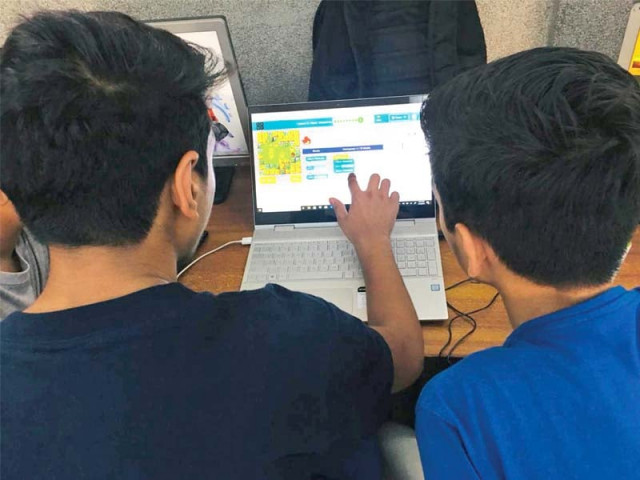K-P’s entrepreneurs on top of their games
IT graduates are coming up with innovative businesses

Two children learn digital skills. PHOTO: EXPRESS
“We received six-months training from the Khyber-Pakhtunkhwa Information Technology Board (K-PITB). After the incubation, our four-member team was able to start a stand-alone project called the Aqua Green Project,” Majeed told The Express Tribune.
Majeed further said that almost 90 per cent of the work has already been done on the project and it will be launched soon. Once it is started, the information related to the project will be disseminated through different media to appeal to farmers across the province. The team will also approach the agricultural department.
“Once implemented, soils and plants will be automatically watered through a given mechanism to stop the wastage of water,” Majeed explained.
In January 2018, the K-PITB established a unique incubation centre called Durshal in three cities of the province, including Peshawar, Mardan and Swat. A total of 13 startups, each comprising four members, were chosen to be incubated at these centres. The Aqua Green Project was one of them.
Govt restricts electronic goods import
Talking to The Express Tribune, Durshal Project Manager Zahid Nawaz said that the aim of the centre is to create more jobs and promote digital businesses in Khyber-Pakhtunkhwa (K-P).
“Through the startups, over Rs39 million worth of revenue has been generated within six months along with the creation of [direct] jobs for over 89 individuals across three districts of the province,” Nawaz said. “So far, the project has been extended to seven districts of K-P.”
He said that the first phase of the Durshal project was launched in August 2018 and it was aimed at the digital transformation of the province through the establishment of a network of community spaces.
“The goal was to enable the youth to collaborate, innovate, have access to training, and launch new businesses in the province,” he said.
Nawaz explained that Durshal also established a vital link between local governments, the tech industry, IT entrepreneurs and investors to support K-P’s digital transformation.
“In Peshawar, the project has created 47 new jobs in the technology sector, followed by 23 jobs in Mardan and 19 in Swat,” Nawaz claimed.
Startups in Peshawar have generated revenues worth Rs17 million along with creating business links with 25 local and two international clients. In Mardan, the startups have gone into businesses with 215 local companies and have generated Rs19 million in revenue. The four startups at Durshal Swat developed businesses with 35 local and four international clients and generated a revenue of Rs2.173 million.
Shedding light on the second phase of the Durshal incubation programme, Nawaz explained that it had kick-started on July 1, 2019, in six districts of K-P, including Peshawar, Mardan, Swat, Swabi, Abbottabad and Bannu.
A few segments shine amid dismal industrial growth
During the first phase of the programme, the selected groups worked on business-related ideas for which they were provided with a stipend of Rs30,000 for six months, together with workspaces and other facilities to help them promote their businesses without any problems.
“Among the 40 newly-selected startups, 13 were led by women, which shows that the women of K-P are equally interested in information and technology,” he added.
The K-PITB embarked on another venture called the Youth Employment Programme (YEP) to impart digital skills among the youth so that they could be more proficient when it comes to starting digital businesses.
YEP Project Manager Muhammad Shoaib Yousafzai told The Express Tribune that during the first phase of the programme — that started in 2016 — around 2,100 graduate students received training, while in the second phase, which started in October 2017, around 8,697 graduate students were trained in digital marketing and different computer programming concepts.
“During the first phase, around 40 individuals were trained, while in the second phase, students received assistance related to the skills that they had acquired through the training sessions. As a result of the training, 28% of students started earning through their own setups.
The K-PITB, in collaboration with the K-P Elementary and Secondary Education Department, launched the Early Age Programming Project in 2017. In the first phase of the project, K-PITB successfully trained 3,000 students across 60 public schools in 14 districts of the province.
The aim of the programme was to introduce critical and logical thinking among school children through innovative computer programming platforms.
Published in The Express Tribune, July 24th, 2019.













COMMENTS
Comments are moderated and generally will be posted if they are on-topic and not abusive.
For more information, please see our Comments FAQ